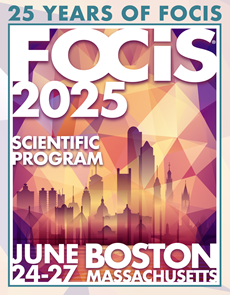Autoimmune Diseases
Session: Immunoengineering and Therapeutics
Engineered Cellular Therapies Targeting 9G4 Idiotope B Cells in Autoimmune Diseases and Lymphoma
Thursday, June 26, 2025
5:55pm - 6:10pm East Coast USA Time
Location: Salons F-G
Brian Mog – The Johns Hopkins University School of Medicine; Yuanxuan Xia – The Johns Hopkins University School of Medicine; Elana Shaw – The Johns Hopkins University School of Medicine; Alexander Pearlman – The Johns Hopkins University School of Medicine; Dylan Ferris – The Johns Hopkins University School of Medicine; Kyle Kaeo – The Johns Hopkins University School of Medicine; Tolulope Awosika – The Johns Hopkins University School of Medicine; Brock Moritz – The Johns Hopkins University School of Medicine; Tushar Nichakawade – The Johns Hopkins University School of Medicine; Yang Li – The Johns Hopkins University School of Medicine; Stephanie Glavaris – The Johns Hopkins University School of Medicine; Sarah DiNapoli – The Johns Hopkins University School of Medicine; Nikita Marcou – The Johns Hopkins University School of Medicine; Taha Ahmedna – The Johns Hopkins University School of Medicine; Victoria Duarte Alvarado – The Johns Hopkins University School of Medicine; Denis Wirtz – The Johns Hopkins University School of Medicine; Regina Bugrovsky – Emory University School of Medicine; Scott Jenks – Emory University School of Medicine; Iñaki Sanz – Emory University School of Medicine; Daniel Goldman – The Johns Hopkins University School of Medicine; Michelle Petri – The Johns Hopkins University School of Medicine; Chetan Bettegowda – The Johns Hopkins University School of Medicine; Suman Paul – The Johns Hopkins University School of Medicine; Kenneth Kinzler – The Johns Hopkins University School of Medicine; Shibin Zhou – The Johns Hopkins University School of Medicine; Felipe Andrade – The Johns Hopkins University School of Medicine; Bert Vogelstein – The Johns Hopkins University School of Medicine; Maximilian Konig – The Johns Hopkins University School of Medicine
- JL
Jin Liu
MBBS, PhD Candidate
Johns Hopkins University
Baltimore, Maryland, United States
Presenting Author(s)
Abstract Text: Systemic lupus erythematosus (SLE) and many lymphomas are characterized by the expansion of 9G4 idiotope B cells. In SLE, these B cells are key sources of pathogenic autoantibodies. While CD19-CAR-T cell therapy has transformed the treatment of severe lupus, pan-B cell depletion increases the risk of infection. Precision immunotherapies targeting autoreactive 9G4 B cells, while preserving other B cells, could offer a safer alternative. Here, we developed synthetic immune receptor T-cell therapies to selectively deplete 9G4 B cells in SLE and lymphoma.
Ramos B cells were CRISPR-edited to replace their endogenous BCR with autoreactive BCRs from SLE patients. Anti-9G4 CAR or chimeric T cell receptors (cTCRs) were expressed in T cells from healthy donors or SLE patients using CRISPR/Cas12 (A). Co-culture of B cells with engineered T cells was performed to determine their potency and specificity. Interferon-γ and autoantibody levels were quantified using ELISA. Depletion of 9G4 B cells in SLE PBMCs was quantified by FluoroSpot and RepSeq.
Both anti-9G4 CAR-T and cTCR-T cells efficiently eliminated autoreactive Ramos B cells (B-C) and their secreted autoantibodies (D-E), while sparing non-9G4 B cells. CAR-T cells showed significantly higher IFN-γ release and proliferation (F-G), but cTCR-T cells matched their cytotoxic potency with reduced cytokine release. Dose-dependent, selective depletion of 9G4 B cells in SLE PBMCs was confirmed by FluoroSpot (H) and repertoire sequencing (I-K).
Anti-9G4 CAR-T and cTCR-T cells demonstrate potent, specific depletion of autoreactive and malignant 9G4 B cells. cTCR-T cells exhibit favorable safety characteristics, making them promising candidates for autoimmune diseases.
Ramos B cells were CRISPR-edited to replace their endogenous BCR with autoreactive BCRs from SLE patients. Anti-9G4 CAR or chimeric T cell receptors (cTCRs) were expressed in T cells from healthy donors or SLE patients using CRISPR/Cas12 (A). Co-culture of B cells with engineered T cells was performed to determine their potency and specificity. Interferon-γ and autoantibody levels were quantified using ELISA. Depletion of 9G4 B cells in SLE PBMCs was quantified by FluoroSpot and RepSeq.
Both anti-9G4 CAR-T and cTCR-T cells efficiently eliminated autoreactive Ramos B cells (B-C) and their secreted autoantibodies (D-E), while sparing non-9G4 B cells. CAR-T cells showed significantly higher IFN-γ release and proliferation (F-G), but cTCR-T cells matched their cytotoxic potency with reduced cytokine release. Dose-dependent, selective depletion of 9G4 B cells in SLE PBMCs was confirmed by FluoroSpot (H) and repertoire sequencing (I-K).
Anti-9G4 CAR-T and cTCR-T cells demonstrate potent, specific depletion of autoreactive and malignant 9G4 B cells. cTCR-T cells exhibit favorable safety characteristics, making them promising candidates for autoimmune diseases.

